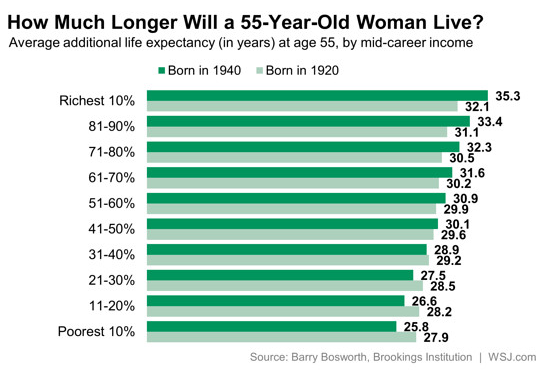Charter Oak Health Center sits in Hartford’s Frog Hollow neighborhood – one of the city’s poorest. In an area where the median household income hovers around $17,000, Lorraine Reardon sees health issues – obesity, diabetes, hypertension, high cholesterol – that are connected, at least partially, to poor diet.
Reardon started work at the center as a dietitian in 2002. She focused on people who were HIV-positive, or people with AIDS, but health center doctors began referring patients to her regardless of their diagnosis.
 “A lot of people are trying to make ends meet with $200 a month,” Reardon said. So they buy mass quantities of processed foods with unpronounceable ingredients on the labels.
“A lot of people are trying to make ends meet with $200 a month,” Reardon said. So they buy mass quantities of processed foods with unpronounceable ingredients on the labels.
The results of such a poor diet are fairly predictable.
A recent study from Brookings Institution says that rich people live significantly longer than poor people, particularly poor women.
In short, money buys the rich a longer life.
The study says the life expectancy of a U.S. woman living in poverty is actually shrinking. Among the most affluent – the top 10 percent – women have seen their life expectancy increase by a little more than three years. At the other end of the economic spectrum – the poorest 10 percent – the life expectancy of women has shrunk a little more than two years. For the first time ever, parents can’t expect their children to live longer than they did, and the findings are borne out in multiple other studies.
The public policy implications for this disparity are astounding. If the rich are living longer than the poor, it isn’t fair to ask the poor to “bear the main burden of an aging society,” says the Brookings study.
Raising the retirement age – an evergreen of an idea traditionally floated in times of economic hardship – means postponing benefits for the people who need them most. And letting jobless benefits lapse (as Congress has done recently) and cutting the food stamp programs (they did that, too) don’t help an already beleaguered population. If Congress wants to continue this culling of the herd, they can simply continue to do what they do.
It makes a sad kind of sense, doesn’t it? The ultimate measure of well-being – life expectancy – would be shorter for people without access to good health care, and with limited resources to pursue a healthier lifestyle. For example, in the short-term, as Reardon sees among her clients, eating healthy costs more – about $1.50 a day more per person, according to a Harvard School of Public Health study. Long term, of course, eating healthy is far less expensive in health costs, but when you’re scraping together money for this month’s rent and tonight’s dinner, long-term doesn’t register.
The relationship between poverty and obesity is “complicated,” according to the Food Research and Action Center, but studies consistently show that the risk of obesity is greater among women and children (particularly Caucasian ones) living in low-income households.
In Connecticut, according to the National Women’s Law Center, 32 percent of female-headed families live in poverty. Reardon sees clients who eat sugary, fatty foods because that’s cheap. “Processed foods are simply low in nutrition value, high in fat, salt and sugars with chemical preservatives and additives – in other words, a recipe for a health disaster,” she said. Sometimes, she is able to convince clients to eat healthy only when their children are – as they inevitably will be – affected by a poor diet.
“Adults sometimes don’t get serious until a health challenge occurs, or if their children are dealing with, say, an obesity issue,” Reardon said. “Parents will be concerned for their children.”
Foodshare visits the center on Mondays, and then Reardon offers dietary classes on Wednesdays to teach clients how to prepare certain fresh produce. Simply distributing recipes in a handout is not enough.
“We’re dealing with a lower literacy rate, so it’s not like you can hand people pamphlets and figure you’re done,” said Reardon.